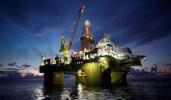5
How Offshore Energy professionals have started transferring into the Decommissioning industry following COVID-19.
According to independent energy research and business intelligence company Rystad Energy operators are likely to increase spending in decommissioning work as there are few profitable investment alternatives since the COVID-19 pandemic took hold. What is more, leading players are expected to assign 10% more of their North Sea spending in the next five years to decommissioning activities (Rystad).
A good moment to catch up with Wesley van Zijp, Team Leader Energy at Atlas Professionals, a specialist recruitment company in the Oil & Gas, Marine and Renewables industries. The global recruiter started to put focus on manning decommissioning projects in the North Sea from their offices in Aberdeen and Hoofddorp last year and continues to see an increased demand for decommissioning personnel.
Deck and drilling crew
“Mainly over the last 1-2 years we have witnessed contractors throughout the supply chain setting up consortiums and creating separate business divisions in decommissioning. We’ve also seen a rise of specialist companies establishing themselves in the decom market.,” says van Zijp, who is based at Atlas headquarters in the Netherlands.
“The rigs these companies use to execute their services, are usually converted jack-up and semi-submersible drilling rigs. This is where a big part of the jobs is created in the first instance, refurbishing these units to make them ready for P&A jobs,” he says. “In this phase, Atlas mostly supply the traditional deck crew positions, such as Deckhands, Mechanics, Electricians and Crane Operators.”
Once the rigs have been converted and are ready to start the P&A campaigns, the crew tends to predominantly have a drilling background. “P&A campaigns show many similarities to drilling campaigns,” van Zijp explains, “so the knowledge and experience of drilling professionals is invaluable.” Atlas, because of its extensive track record in the drilling industry, is also familiar with the various phases and specific requirements of projects. As such, they have a clear picture of which competencies are needed and can support their clients during the full life-cycle of projects.
Future perspective
In line with OSPAR Decision 98/3, offshore installations need to be fully removed in the North Sea, prohibiting dumping, or leaving in place disused offshore installation. According to Rystad, only about 15% of North Sea assets have been decommissioned to date, but in the coming five years an average of 23 assets are expected to cease production annually.
Atlas Professionals continuously monitors leading industry intelligence to understand how the markets they operate within are developing and use these insights to track the effect throughout the supply chain, which ultimately impacts the professionals required to work on these activities. “Looking at these numbers, the decommissioning industry will provide many jobs throughout the North Sea for the years to come,” van Zijp says. “We see a lot of professionals make the transfer to this new industry as they are able to see the potential for long term stability and career development.”
Patience remains a virtue, though, as a complete view of all offshore decommissioning shows that activities are picking up and are expected to peak over the period 2021-2024 (
Nexstep). “The pandemic has had a massive impact on the Energy industry. But, who knew, with the reduced production and exploration budgets that followed the falling oil and gas prices, we may as well see companies bringing forward their decommissioning plans. In any case, we’re ready to support both professionals and clients that wish to speed up their transition to the decommissioning industry,” van Zijp concludes.
Find out more about Atlas Professionals' decommissioning services and available opportunities
here.
Author: Anastasia Tatarova
Back to overview
.png)
.png)


